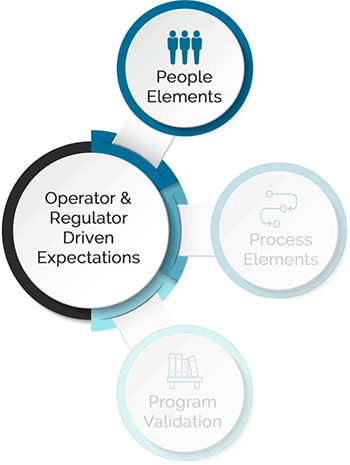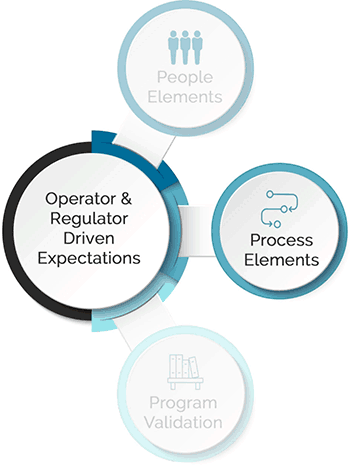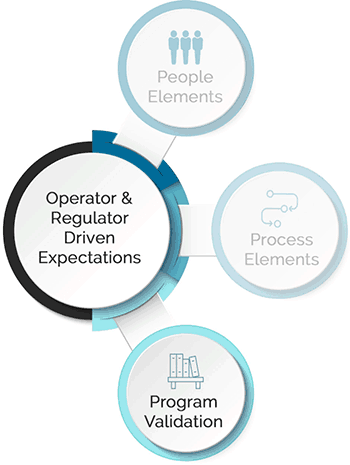- Home
- /OQIP Program
OQ Integrity Process (OQIP)
Establishing High Credibility & Validity in a Universal Approach to PHMSA’s Operator Qualification Expectations as Developed and Created by the Industry’s OQ Integrity Coalition

People Elements
- Auditors | Trainers | Proctors | Evaluators
- Selection Criteria & Credentialing:
- Education
- Training
- Experience
- Qualifications & Certifications
- Validation & maintenance of credentials
- Applies to Internal, External, & Independent individuals

Process Elements
- Covered Task List
- ASME B31Q Standard
- Detailed Core Competency Development Driven
- Program Focus on Common, Universal Truths
- Training Curriculum Consistency
- Testing Methodology, Integrity, & Security
- Skill & Ability
- Observe/Verify Performance
- Management of Change Controls Elements

Validation Elements
Program Compliance Validation:
- Internal Self-Audit
- Program Effectiveness Reviews
- External/Independent Audits
- Recordkeeping/Documentation
Operator Qualification Integrity Process Pilot Programs
The OQIP Coalition members have focused on holding 3 Proof-Of-Concept Pilot programs across the United States. These OQ Integrity Process Pilot programs are a part of our Plan, Do, Check, Adjust, continuous improvement practices. The companies listed below are those whom have volunteered to be part of piloting the program elements and practices, and report back to the full Coalition membership group so program improvements and lessons learned can be incorporated into the program and documentation. See Pilot Programs below:
Pilot Programs
- New Mexico Gas Company, Albuquerque, NM – White Paper
a. State Regulators from the New Mexico Public Regulation Commission;
b. Contractors performing PHMSA OQ Covered work;
c. OQ Service Provider, Industrial Training Services (ITS). - SEMCO Energy, Port Huron, MI – White Paper
a. State Regulators from the Michigan Public Service Commission;
b. Contractors performing PHMSA OQ Covered work;
c. OQ Service Provider, ENERGYworldnet (EWN) - Puget Sound Energy, Bellevue, WA – White Paper
a. State Regulators from the Washington Utilities & Transportation Commission;
b. Contractors performing PHMSA OQ Covered work;
c. OQ Service Provider, Midwest Energy Association (MEA)
The framework for the OQIP Pilot Programs include the associated stakeholders engaging together, identifying existing gaps, and shoring up those variances; incorporating and adopting the elements, processes, and expectations of the OQIP program; identifying and measuring successes and improvements needed; validating the People, Process, and Program Validation metrics through documented audit records of experiences and deployment findings; revision to the OQIP through evaluation output and improvement modification actions necessary to assure a common, streamlined, and standard approach to the deployment of OQ, with Integrity as the foundation.
Post the Pilot Programs, the modified OQIP will be fully achieved, and expansion of these higher-level Integrity Processes in the deployment of Operator Qualifications and elements making up those deliverables, will be expanded into other States, Operators, Contractors, and State Regulatory Agencies, with the earmark of PHMSA support for “higher-level” deployment, integrity, and accountabilities in OQ.
The success of the OQIP Pilot Programs will be measured by the level of consistent confidence in the outcome of all elements of the OQIP; the consistent visibility of Integrity demonstrated; the consistency in the deployment of the Program elements; the consistency in the goals and outcomes being achieved; and the improvement in the outcome of derived training, testing, performance evaluation, OQ credentialing, and the transfer of an individual’s OQ record/credentials from one OQ provider and/or employer, to another.